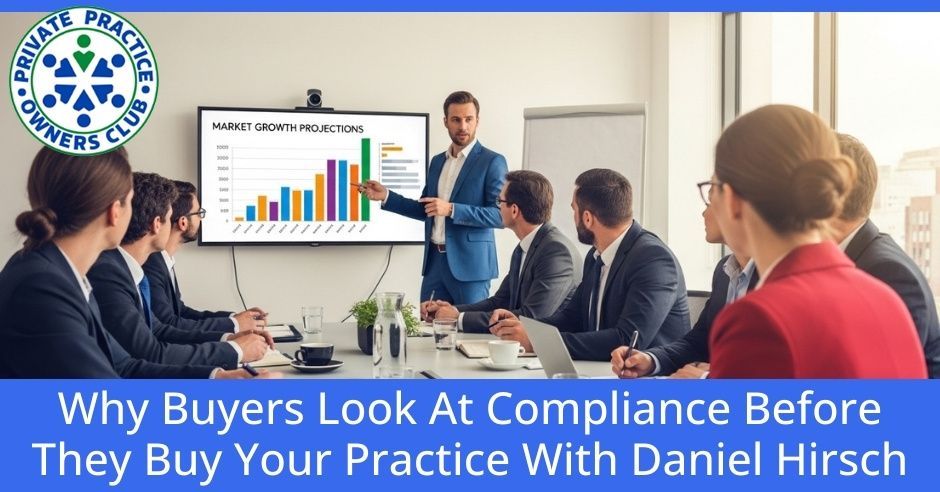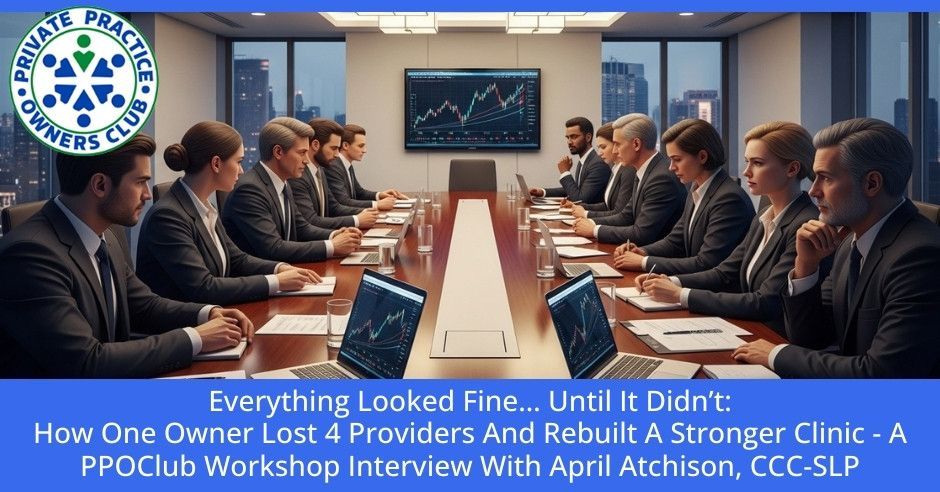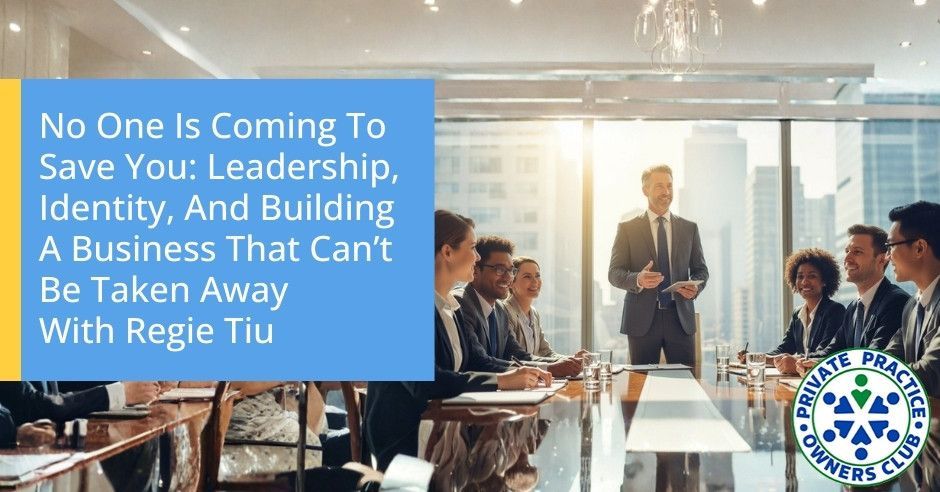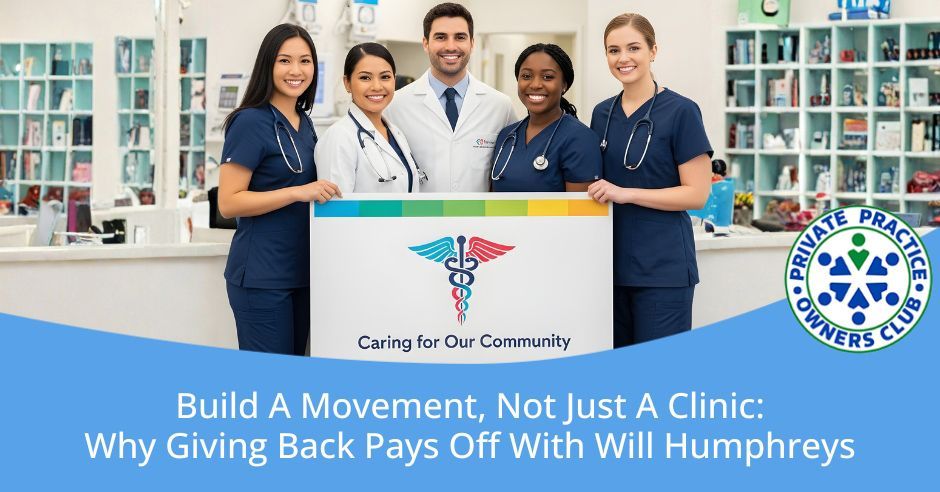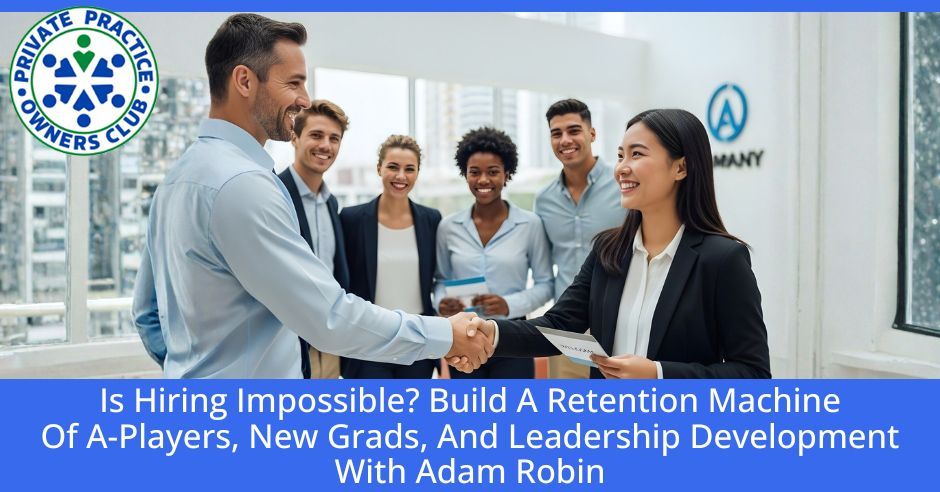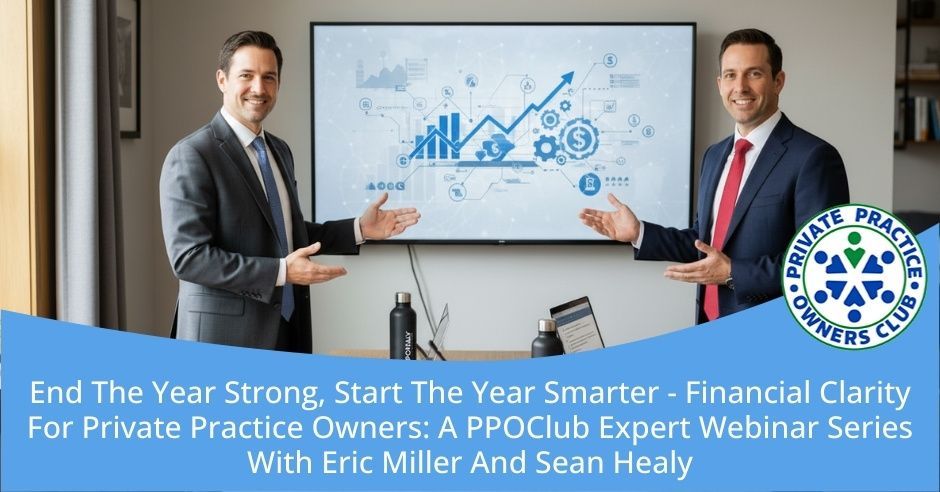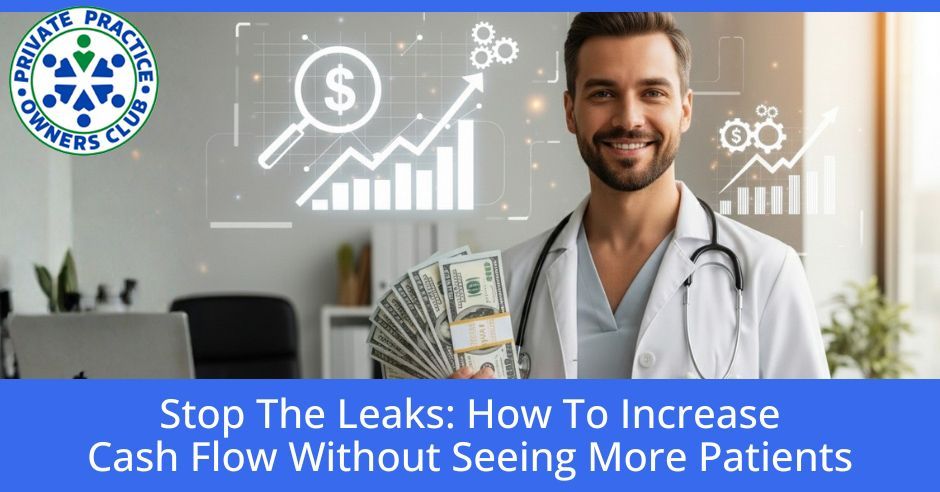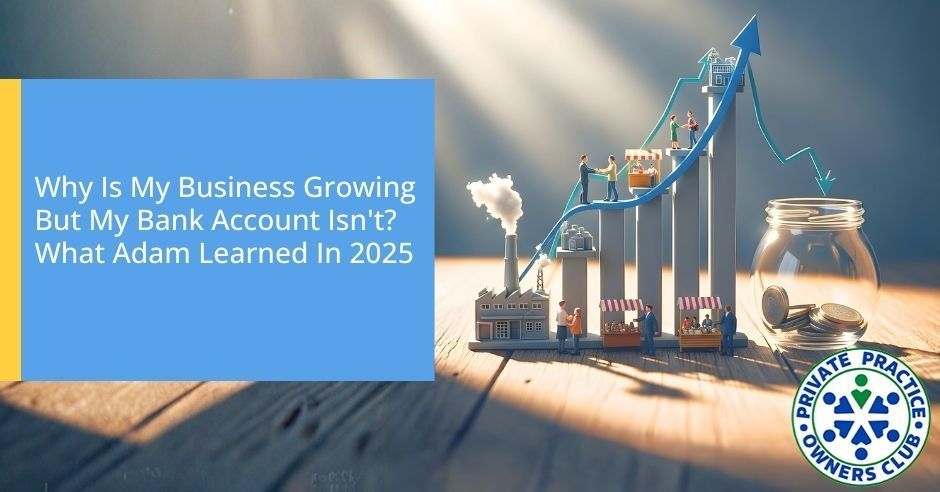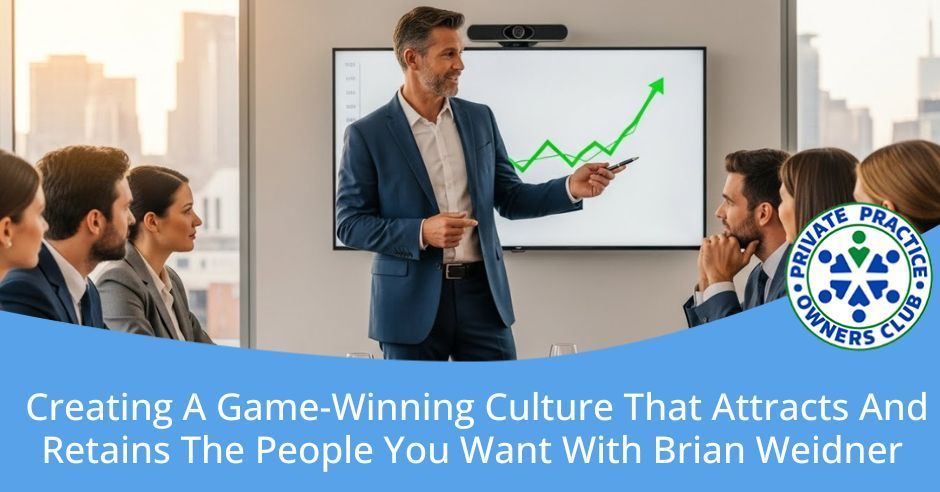Why Your Business Won’t Love You Until You Learn To Love Yourself With Kelly Higdon
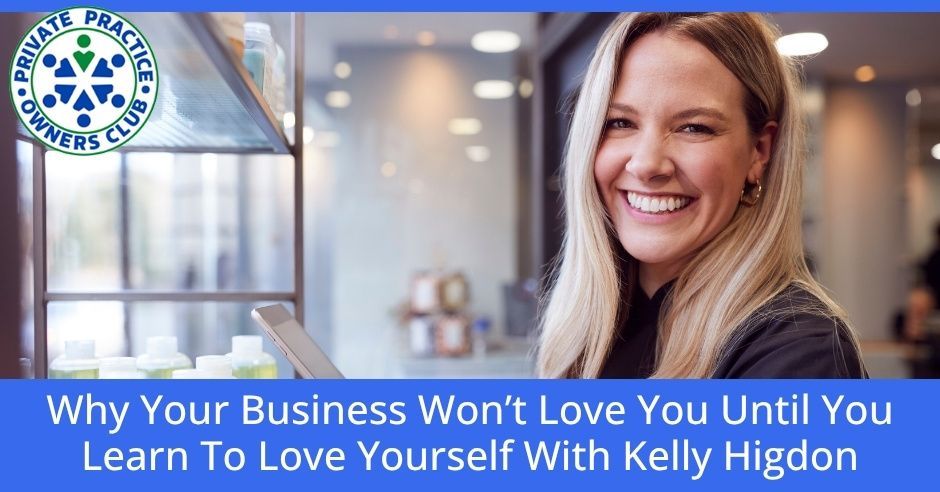
Most practice owners believe burnout is just part of the job — long hours, heavy workloads, and endless demands. But what if burnout isn’t a personal flaw… what if it’s a system problem?
In this episode of the Private Practice Owners Podcast, host Adam Robin sits down with Kelly Higdon, co-founder of zynnyme, therapist, business coach, and author of Therapist Burnout. Kelly has spent the last 15 years helping practice owners rebuild their businesses (and their lives) from the ground up — without losing themselves in the process.
They dive deep into:
- Why burnout isn’t about self-care — it’s about broken systems
- How personal growth and leadership maturity shape business success
- The hidden mental and emotional patterns that block execution
- Why alignment, not hustle, creates sustainable progress
- The surprising connection between self-compassion and team performance
- How to build a practice that serves both your clients and your life
If you’ve ever felt stuck in survival mode — doing “all the things” but never feeling at peace — this episode will help you rethink how you lead, grow, and take care of yourself while running a thriving business.
🎙️ Learn how to lead from alignment, not exhaustion.
👉 Connect with kelly@zynnyme.com
Want to talk about how we can help you with your PT business, or have a question you want to ask? Book a call with Nathan –https://calendly.com/ptoclub/discoverycall
💡 Love the show? Subscribe, rate, review, and share!https://ptoclub.com/
99.5% of successful owners interviewed on this podcast have at one time or another leveraged a business coach to improve their business. Private Practice Owners Club is the coach you need –ppoclub.com
---
Listen to the Podcast here
Why Your Business Won’t Love You Until You Learn To Love Yourself With Kelly Higdon
A deep dive into how entrepreneurs and healthcare professionals can overcome burnout, build alignment, and lead with emotional clarity.
Welcome to the Private Practice Owners Club. I’m your host, Adam Robin. We have a special guest, Kelly Higdon. Maybe you heard of her or maybe you haven't. We just met. Kelly is the Cofounder of ZynnyMe and Business Coach for many years. Also, a practice owner for 78 years, eventually sold. We'll get into all that, but the cool thing about Kelly is she is a licensed Married Family therapist in the mental health space. We don't get a lot of guests in the mental health space. I’m super interested. Maybe we're doing this episode a little bit for selfish reasons but I'm just curious to learn about you and what you see in the business world and uncover your story.
The Entrepreneur's Journey: From Burnout To Personal Growth
Thanks for having me. There's a lot of alignment in who you work with and who I work with because there is always a mental health component to the work. Whenever we're working with anything somatic, that's also connected to our hearts and our minds. There's a lot of alignment there. I find a lot of this speech therapist I've worked with does see that mental health component with the work that they're doing. I see a lot of crossover.
That's why I get fired up when we talk about the leadership side of things, the emotional side of things, or the mental health side of entrepreneurship.
I read a book on burnouts. I’m into it.
I know we’re not here to talk about my story, but I want to tell you just quickly why it's important to me. The greatest reward that I experienced during my entrepreneur journey is the personal growth and development that I had along the way. I remember being this business owner that was frankly lost. I could not see two inches in front of my face. I was just completely burned-out, stressed-out working, and barely hanging on mentally and physically.
I hired my coach Nathan, who's now my partner. Literally, he pulled me out of the gutter. I don't have it all figured out, but I feel I’m much more control of my life and I have more control in the direction that I take things. I don't feel like I'm on the emotional roller coaster as often. Learning those skills has helped me impact other people's lives a lot better too.
That's so funny because I was working in a county mental health. I was running one of the largest clinics in the county and I was burnt out. I was looking at going back to school. I was looking at maybe going to medical school or nursing school. I decided my private practice was my last-ditch effort and I hired my coach who is now my business partner. That's how we formed ZynnyMe.
Creating my practice was the healing to my burnout. We've written a book on therapist burnout because it is so common. Burnout is not like, “You don't go for enough walks or take enough bubble baths.” It's a sign of a system that's broken. What I love about having your own practice is while we're in this capitalistic system that is pressing down and asking the clinician to fill in the gaps of the brokenness, we can still create our own little bubble that protects us from burnout.
We create the system. We are the creators who write. I love that sovereignty that owning your own business gives you, and I agree with you. Building a business is your biggest personal development course you will ever take. Some of it just comes with time. Some of it is just like maturity . When I look at my fourteen-year-old, I'm like, “This is normal. You're going to grow into figuring some of these out.” Other times, people need the knowledge and skill development to navigate the whole journey.
The perspective. You're much more of an expert on the mental health side of things. I can always speak from experience. Forgive me if I sound like a toddler as I talked through all these things, but perspective helps me. You don't know what you don't know. You see the world through this lens that is built around the experiences that you've had and the upbringing that you've had. The product of that sometimes causes you to feel like you have no options because you can't see them. In order to see new things, you must hang out with people who've been there. That's what I've got from a lot of that and what I got from coaching. Nathan was like, “Have you ever considered this other thing?”

You just don't know what you don’t know.
“You can't even see that's right next to you? You just got to turn your head to the right and see it.” That creates this euphoric feeling of like, “I have options now. I can have a vision and I can create.”
It's like a family. When you're racing your family, you think this is how family is. This is what relationships look like. When you go to create your own family or your own business, which is you creating your own system. We replicate those patterns because that's what we know and that's what's comfortable. Our whole nervous system is like, “I create familiarity.” If you come from chaos, I bet you do business like chaos. If you come from slow processing, your business will be slow processing. Those kinds of things. we’re mirroring. When we have community and we bring in other voices. It helps us shift faster and heal some of those things that don't work for us anymore.
The Entrepreneur's Limiter: Overcoming Self-Imposed Blocks
I hear what you're saying and I understand it. I just haven't heard it communicated so cleanly, but it's so true. That's why you always hear the entrepreneurs say, “It's a game. It's you versus you.” You're always the limiter. You're always the bottleneck. You're always trying to figure out what silly habit or belief that you are holding onto that you need to let go of that. You are not quite aware of it yet. Sometimes that's where a great business coach or a mastermind or just a good accountability friend can just call you out. They will be like, “Kelly, you look like an idiot now. You need to stop that.”
All of our coaches are trained in brain spotting. I don't know if you've ever heard of it, but it is a cool tool for any of your PTs and OTs as well. It can help with the integration of what you are teaching your clients. It came from EMDR, which is using eye movement to help the brain rewire. Instead of brain spotting, it uses gay spots but it can help you rewire your brain and expand into creativity. Sometimes, there's this block and you're like, “I don't know why I don't want to raise my fee. I feel gross about it. I keep fighting around it.”
The brain spotting can help you take that feeling, hold it somatically and then your brain starts to process where this comes from and then you can expand into what you want to create. You start to notice behavioral changes, even at a PT level. I've seen people do this for performance enhancement and all sorts of cool stuff. It can help people if they are struggling with implementing or integrating the treatment that they are being given. BrainSpan can help with that.
We’ve seen that with CEOs, entrepreneurs, and leaders. They've got the knowledge but there's these blocks to implementation. There's these blocks to follow through. Some of that brain spotting can help extract some of those blocks and help you understand where they're coming from and how they've been there to protect you. Maybe you don't need that protection anymore.
This is super helpful because we have our annual conferences and I'm supposed to get out there and talk about execution. I have my way of getting things done and I would love to hear yours.
How do I execute?
We don't have to diagnose it all but you had mentioned that there's these blocks to implementation, is what you called it. To me, that means execution because you're exactly right. When you think about creating anything meaningful, it doesn't come down to your ideas or what you talked about. It comes down to what you get done. Usually, we know what we need to do but for whatever reason, we don't execute on it or we have a hard time creating alignment with our team around it. What do you feel are some of the keys that you help entrepreneurs with around that?
Who I was many years ago and how I executed it is so different than how I execute now. I used to work from a five-year plan and reverse engineer. I don't do that anymore. I'm much more likeable within a year because things change pretty rapidly now for me. I used to project out five years and have this whole vision. I had a whole course on it like how to calendar it out and reverse engineer. I always prioritize my life first and then I see where my business can fit into it.
Building a business is the biggest personal development course you will ever take.
That, hands down, has never changed. I go through the year and I plan out all my time off. I look at the things and the events I want to do. I make sure there's lots of room for my life and then I fit the business into it. I look at it like, what is it that I want to achieve? I got back to what's important week to week. I use Asana and all of that. What I noticed is that if something is staying on my Asana board and I'm not getting it done. It is not about pushing. That is something that's very cultural to the American mindset of like hustle, push, and do it anyway.
Grind, which you're leaning on me. I do that.
It's so disembodied. What happens is, why you aren't getting by in your team is that you aren't an embodied leader. You’re not convincing me because you're speaking but the energetics are not aligned. That doesn't draw me in. In fact, that makes me feel more suspicious and less like I want to follow that. A true visionary is inspiring and aligned. If you're not in your alignment, your team is not going to follow very well.
They may for a while until they figure it out and then it's going to fall apart. That's where I do more of that somatic work of like, “Where is the conflict within myself? What is going on? Why is this continuing to be on my list of things and me not touching it? Getting more curious about that because if I can start to understand that pattern and unleash that and heal that or figure it out, then I'm not going to have this ongoing struggle. Some of the brain spotting does help me with that. If I get stuck, I just notice where resistance is. I lean in and get curious about it, instead of pushing through it.
I don't know if there's a right answer to it, but I just heard the word alignment and that resonates with me because I was raised by a father who was blue-collar like, “Shut up and work,” kind of a dude. I find myself pushing into things that I probably shouldn't.
I pushed myself into an ER visit one time and I can't do that again.
Business In Service Of Life: Prioritizing Self-Love For Success
I literally said this out loud. I said, “Your business won't love you until you learn to love yourself.” It’s like you mentioned. First, you identify what's important to you and your life and you serve that as a priority.
My business is in service to my life.
Correct. Many times, we as CEOs, especially me. We treat ourselves like crap. We’ve worked too hard. We tell ourselves to shut up and we don't matter. We just push through things that don't serve us. I can tell for myself when I look back at all the times whenever my business was doing the best and whenever I was happiest. It's always when I prioritize myself. I'm pouring myself into it. I'm eating well, sleeping well, and doing things that fill me up well.
What are we here for? As I said, I have had those moments and, for me, it's very ego-driven. My identity was wrapped up in my business. Some of the work I do with people in their practices is I have them talk to their business like its own person. If you're in an intimate relationship with a person, you don't just constantly demand something from that partner. You have to nurture that relationship and it's the same for the business. We're just like, “I do all this for you and you do nothing for me.”
There's just this demand. There's not a loving relationship with the business. The business is like, “How am I going to give you clients if you're not showing up for me in the right ways? If you don't like taking time.” You think you know everything. Instead of looking at the data and taking time to understand and getting the support you need. I will have them speak as the business and then they'll speak as the owner back and forth and realize like, “I've wanted this business to be successful, but I'm focused on the wrong things. I'm not nurturing it.”

At the end of the day, they're still things on the Asana board that have to get done. How do you get them done?
I make time. I batch my time.
What if you don’t want to do them? What's the next step?
That's where I get curious about the somatic aspect of it. I will sit and feel the resistance in my body, then I will close my eyes. I will talk to that resistance and get very curious about, what are you wanting from me? What would you rather be doing? What is coming up for you? Nine times out of ten that resistance has a purpose. If we push through and bulldoze over that, we are missing the point. We are missing the lesson.
If you want resistance to go away, you have to give resistance to the microphone. I have a project now. Part of it, I feel incapable and that's partly why I've just been avoiding it. If I sit with the resistance and then I can have a conversation with it and realize, “I'm needing more support.” I asked for that to get it done. It's having a relationship, getting curious and talking to those parts of yourself that are like, “I don't want to do this.” Instead of being like, “You're going to do it anyway.”
I used to tell clients this. If you had a kid and you took them to the park. At the top of the slide, you're like, “Slide down. It will be fun.” They're like, “I don't want to.” You don't scream at them and be like, “Get down the slide." You're like, “What are you nervous about? What's going? Do you want me hold your hand?” The same thing but we're not doing it with ourselves. We are not treating ourselves with the kindness and compassion we need.
There are days like I have certain days where I batch certain things. I don't have meetings typically on certain days. That's my neurotype, too. That's another thing you need to think about. It's not just the emotional makeup of a person. It's the way our brains work. If someone has ADD or any neurodivergence, you want to accommodate your task list to how you do things. Some people need consistency, the same routine every day. Other people batch in months, quarters or weeks. We're all different.
There are people in this world who don't want to go there with you like it feels woo-woo. It feels like, “Give me the step. Give me the freaking blueprint.” Is there a space for people like that in your world? How do you help them? How do you navigate that type of client? How do you navigate that type of leader on your team?
To be honest, when I started my entrepreneurial journey, I was very much like I would talk to Miranda and I'd be like, “Tell me the steps.” I would do the steps and I was very successful but then there came a point where the success capped out. That's where cookie cutters can only go so far before you need to tailor something creatively to you, your team and your vision.
I do love giving plans and there are some facts out there. There are some definite strategic things that you must do. There's a lot of creative capacity. At some point, you will hit a limit and you can keep doing like formulas, but it will only get you so far. It doesn't have to be woo. We're talking about just simple like understanding yourself and your makeup.
We are not treating ourselves with the kindness and compassion we need.
Building Systems For Success: Clinical Outcomes & Client Journey
Let's transition over real quick to what we talked about before the call. You were talking a little bit about what you do with owners. What I remember hearing is, you work on trying to build systems that improve outcomes inside the business. Can you talk around that? How do you help owners think about solving those types of problems?
When you are creating a practice, you have to understand who you are serving and understand their psyche, as well as the pain points so that you can meet them where they're at. When people are like, “Is my marketing successful? My phone's ringing off the hook. I'm booking. I'm full.” That's not success to me. Success to me is a successful completion of treatment. You could have your phone ringing but people only make it to the third session and then drop out. Is your marketing really working? It's not.
What is it we need to change into the marketing so that we get people that want to stay for the duration of treatment? What is it that we can do in our initial consultation that can get the buy-in for the treatment? What can we do along the course of treatment to keep them engaged to the end of treatment? Whatever service you provide or what that looks like. There are processes. If I think about it, how do people book with me? If I create a lot of barriers, I'm going to have a lot fewer clients come to me, but there are some things that I might want to create barriers for so I get the ideal people that are going to stick.
If I'm a cash paid practice, I need to be clear up front. I want them to check a box. I have reviewed the fees. I understand this does not cause me financial hardship. We already know before we hop on the phone with them that they have awareness and that they're more committed. All of these little steps from our marketing message to how we do the client journey. How can we improve the chances that they're going to complete treatment successively and have a good clinical outcome? That is very important to me. You can have great marketing, but if you don't have the service to back it up that's not great. I believe in profitability and sustainability for the owner but also great clinical outcomes because you create a feedback loop.
Those are the same.
If your clients are terminating well, they are more likely referred to you. Their doctors are seeing the transformation. They're going to refer to you. You're creating more ease for yourself. You're going to feel a heck of a lot better about the work you do as well.
When you put that type of energy into your product, you become a real believer of your product. You get excited about your product and you can sell it. You get your team around it. There's a lot of good things that happen whenever you put a lot of energy into your product.
Also, when you have a team. A lot of times, we come out of school or our training and we're like, “Am I enough?” All of our training tells us we're not. You have to put in the hours and work for nothing. You go through all these processes. It's just like, “I'm just never going to arrive.” We aren't taught what good clinical care looks like, what great clinical outcomes look like, how what you're doing is good and that it's making an impact. We need to teach our team that. We need to build their confidence to look for that and to care about that. If they're not feeling good about the work that they're going to do, you're going to lose them as staff. You're going to have retention issues. It also helps your team stay more cohesive for sure.
Managing Expectations: Proactive Communication For Better Outcomes
I wrote down managing expectations, which is the way I define this idea of getting out ahead of the objection with or from your patients. Whether it's money or scheduling or whatever it is. One thing that we do is we help owners with recruiting. Now, it's hard to hire clinicians. It's very tough.
It is wild out there.
You can have great marketing, but if you don't have the service to back it up, that's not great.
We're on this call and this is a tip for anybody reading who's having a hard time recruiting. We're out there pushing our job out on Indeed and we're getting a lot of people that are saying. “Denied. I don't want to work there because of the location.” This was a practice owner in Alaska. I said, “I got an idea. How about in the second line you overcome that objection? You just say, ‘Are you a clinician who wants to be autonomous? Before you have questions about Alaska, I want to let you know that we're giving you a big sign on bonus to consider moving here. Also, here's the other perks of moving to Alaska. Let me tell you a little bit about our company.’”
The next week, two people applied. It comes back to like addressing the fear or addressing the discomfort. If you can understand why your patients are dropping off or why your customers aren't getting what they need from you. You could be more curious around that and be willing to confront that earlier in the process. You're more likely to have a better outcome, whether that's recruiting or marketing or whatever it is.
I had a client. She provided a service that was normally 8 to 10 sessions. She worked with couples and right after the third session, they dropped out. She was like, “It's almost consistently, like 70% of the people would drop out at the third session.” I was like, “When you do your intake call, you're going to say by the third session, you're going to want to quit. I can’t do this process.’ On the third session, you'll be like, ‘After this, you're going to want to go home and quit but remember what we talked about, if I can get you to that eighth session, you're going to get what you want, so please stick with me.’” She went from like 30% completion rate to like 90% completion rate. Knowing the patterns or talking about the elephant in the room and just being honest about it is so important.
That's a good topic that we probably don't talk about enough. I had a good friend of mine. His name is Will Humphreys. I'm going to be a little bit extreme on the words but part of the onboarding process for his clinicians used to be something like, “Welcome to your first day. Let's talk about what it looks like when you quit. When you quit, you're going to put in a 30-day notice.” I used to think that was so weird. I didn't understand the genius behind it until later, but it's just the same thing.
My partner Nathan always recommends when you're running a business, when you're trying to balance that clinical care with profitability. There needs to be some type of productivity expectations based on your reimbursement levels and that thing. Depending on where you're at in the country, not every clinician's comfortable with seeing that many patients a week. Whether sometimes it's 30 or 50. If you're in New York, they're seeing like 90 a week.
That's why you have those conversations in the interview. It's like, “By the way, here in this practice, this is our expectations. We don't want to force you to do this. We want to give you an opportunity to accept this. Do you feel comfortable with that type of case load?” Getting out in front of those issues early.
That's why I think when a lot of people move into a group practice like that, they figure it out with their first hire instead of like looking at, this is where you need to look ahead. What is your pay scale? What is the productivity scale? How does it all scale up? I, as an employee, I'm going to want to come in and know what the potential is. You got to paint a picture for that potential for them and of reason to stay.
If they're like, “I know I made this and this is how many people have to see.” That's all they know. Don't you feel lost? Can you imagine just sitting there like, “This is what it is.” If you hold a bigger vision and you show them their path as well. You're creating pathways. You create the client journey and a journey for your employees as well and give them that vision so that they know. It's very clear from the get-go.
Healthcare is tough. Reimbursements are declining, costs are going up. All the things.
We have AI replacing us, so it’s very fun.
We have a lot of clinicians, specifically younger clinicians who are coming in and wanting higher salaries. They want to earn money. They want the money now. What I have found is that sometimes, there's no way to solve that problem. One of the ways that I have found to solve that problem is to help them understand what it's going to take to get to where they want to go. Especially the younger clinicians. They're not so tied up on exactly what they get paid, but they just want to know that there's an opportunity to earn more in the future.

If you could support them with mentorship or other things, flexibility on the schedule or whatever that is. They are much more likely to choose a place that can help them have a vision for themselves. I don't know but what I have heard about the mental health space is that there's a solo practice owner and then there's the group practice owner. How do you guys build that out? Also, you guys use 1099.
No. I am pro W-2. It's very hard to do mental healthcare as a 1099. You will see that. I feel like a lot of these companies that are doing 1099 are having labor disputes.
I'm totally with you. I just want to hear your perspective there. I haven't seen very many successful group practices.
The only time I've seen it work is where you do a co-op model. You're providing like, “Rent my office space. I have a website. I do marketing. I provide these kinds of services, but I don't control your practice.” That can be like a 1099. Look at the federal guidelines. It's pretty hard to do our work and not be a W-2.
The Phoenix Principle: Recreating Your Practice For Well-being
Last question. What's the message that you want to give to the healthcare entrepreneur, the practice owner? What's the important thing that you want them to know?
I feel like if you are feeling burnt out, it's not bubble baths that are going to help you. It's going back to the basics of the system that's surrounding you. Sometimes, you got to tear it down and be like a phoenix in the ashes like recreate. We built based on what we know and what's familiar. As you have more time with it, you might discover it burns you out and it's okay to pivot. It's not like there's something wrong with you. It's first looking at what needs to shift within what you've created to support you better, your staff better, and your clients better.
The one thing that I've realized more is, I used to think whenever things clear up my calendar, I'll be able to feel good or be happy. It’s like, once I feel good, I'll do the thing. Now I'm realizing that it's what I choose to do that helps me feel good. I totally line with that. If anybody wants to learn more about you, your team, your services, and your methodologies. How do they get in touch with you?
You can go to ZynnyMe.com. We have over fifteen hours of free training. You can download our book for free on Therapist Burnout. It applies to OTs and PTs. The concepts in there are still the same, because we're service professionals in the healthcare industry trying to help people heal physically, emotionally, and all these different ways.
Thank you for being here.
Thanks for having me. It's nice to chat.



